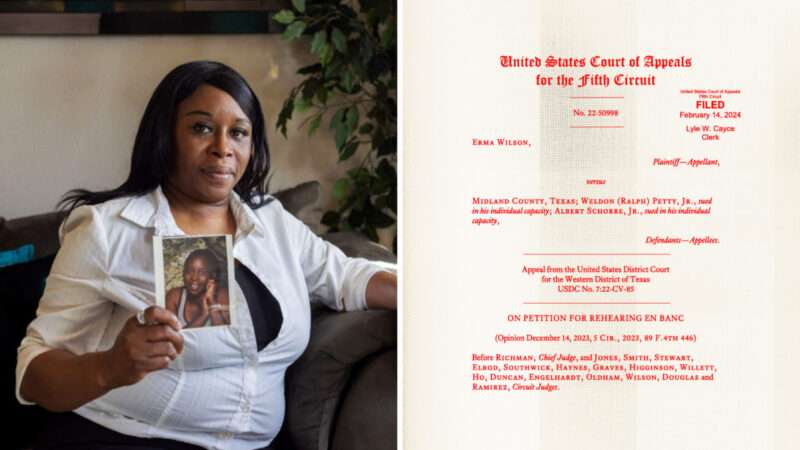
The job of the prosecutor is to hold the public accountable. But when the tables are turned—when the prosecutor is the one who allegedly flouted the law—it is, paradoxically, enormously difficult for victims to achieve recourse. Lawyers yesterday sparred at the U.S. Court of Appeals for the 5th Circuit over one such barrier preventing someone from suing a former assistant district attorney accused of misconduct so egregious that one judge on the 5th Circuit described it last year as "utterly bonkers."
At the center of the case is Ralph Petty, whose yearslong career included work as both an assistant district attorney and a law clerk—at the same time, for the same judges. In practice, that means his arguments as a prosecutor were sometimes performance art, because, as a law clerk, he had the opportunity to draft the same rulings he sought in court. It doesn't take a lawyer to deduce that the set-up presents troubling implications for due process.
One of Petty's alleged victims, Erma Wilson, would like the opportunity to bring her civil suit against him before a jury. In 2001, she was convicted of cocaine possession after police found a bag of crack on the ground near where she and some friends were gathered. Law enforcement offered to let her off if she implicated the guilty party; she said she didn't know.
Years later, that conviction continues to haunt her. Most notably, it doomed any chance of her fulfilling her lifelong dream of becoming a nurse, because Texas, where she lives, does not approve registered nursing licenses for people found guilty of drug-related crimes.
Wilson's conviction coincided with the beginning of Petty's dual-hat arrangement in Midland County, Texas. Though he was not the lead prosecutor on her case, she alleges he "communicated with and advised fellow prosecutors in the District Attorney's Office" on her prosecution while simultaneously working for Judge John G. Hyde, who presided over her case, giving him "access to documents and information generally unavailable to prosecutors." (Hyde died in 2012.)
"Further undermining confidence in Erma's criminal proceedings, Petty and Judge Hyde engaged in ex parte communications concerning Erma's case," her lawsuit reads. "Consequential motions, such as Erma's motion to suppress, were resolved in the prosecution's favor throughout trial. And despite the weak evidence against her, Erma's motion for a new trial was not granted. Any of these facts by itself undermines the integrity of Erma's trial. Together, these facts eviscerate it."
Typically prosecutors are protected by absolute immunity, which, as its name implies, is an even more robust shield than qualified immunity. But that issue is not before the 5th Circuit, because Wilson must overcome another barrier: Someone who has been convicted of a crime may not sue under Section 1983—the federal statute that permits lawsuits against state and local government employees for alleged constitutional violations—unless "the conviction or sentence has been reversed on appeal or otherwise declared invalid," wrote Judge Don Willett for the 5th Circuit in December. "The wrinkle here is that Petty's conflicted dual-hat arrangement came to light only after Wilson had served her whole sentence."
But Willett—the same judge who characterized Petty's alleged malfeasance as "utterly bonkers"—did not appear happy with his own ruling, which he said came because his hands were tied by precedent. He invited the 5th Circuit to hear the case en banc, where all the judges on the court convene to reconsider an appeal, as opposed to a three-judge panel (the usual format for evaluating cases).
The court accepted. "The defendants say that [Wilson is] forever barred from invoking that federal cause of action or any other federal cause of action unless she first persuades state officials to grant her relief. If they never do, she can never sue," Jaba Tsitsuashvili, an attorney at the Institute for Justice who is representing Wilson, argued yesterday. "In most circuits, that argument would be rejected, and rightly so."
At the center of the case is Heck v. Humphrey (1994), a Supreme Court precedent that, as Willett noted, forecloses Section 1983 relief for plaintiffs alleging unconstitutional convictions if his or her criminal case was not resolved with "favorable termination." The catch: Most federal appeals courts have established that Heck does not apply when federal habeas relief is no longer available, as is the case with Wilson. The 5th Circuit is an exception.
Perhaps soon it won't be. Yet even if the judges agree with Tsitsuashvili's interpretation of the law, Wilson is not in the clear. She will then have to explain why Petty is not entitled to absolute immunity, which inoculates prosecutors from facing such civil suits if their alleged misconduct was carried out in the scope of their prosecutorial duties. It is nearly impossible to overcome. But Petty may not be a candidate for it, because his malfeasance was technically not committed as a prosecutor. It was committed as a law clerk.
Should Wilson be granted the privilege to sue, it will be the first time an alleged victim of Petty's gets a tangible chance at recourse. There was, of course, the fact that he was disbarred, but defendants whose trials were marred by Petty likely take little comfort in that, particularly when considering it came in 2021—two years after he retired.
The post Can This Woman Sue the Rogue Prosecutor Who Allegedly Helped Upend Her Life? appeared first on Reason.com.







